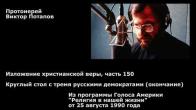You are here
Thou shalt not commit adultery
Thou shalt not commit adultery.
In this commandment, the Lord God tells husband and wife to be faithful to each other, and for the unmarried to be chaste, that is, to be pure in deed, word, and desire. From the beginning, God set the rule that a man and a woman should be for one another only. It pleased God that they remain not just spiritually inseparable, but that they be also one body. Only in such unity of thought, feeling and desire could God's other command be fulfilled: Be fruitful and multiply. Therefore shall a man leave his father and his mother, and shall cleave unto his wife: and they (two) shall be one flesh (Genesis 2:24), we read in Genesis, the first book of the Bible, and further, in the same book: And God blessed them, and God said unto them, Be fruitful and multiply, and fill the earth and subdue it... (Genesis 1:28). With regard to the duty of spouses to preserve mutual faithfulness, Christ said: What therefore God hath joined together, let no man put asunder (Matthew 19:6).
Every extramarital union of a man and woman directly violates the commandment: Thou shalt not commit adultery. And every sensual overindulgence, and every action promoting such things also violates the Seventh Commandment.
In Christian marriage filled with deep love, sexual life does not disturb the psychic harmony of the spouses. Sexual life enhances love and adorns marital harmony. Outside of marriage the manifestation of sexual instinct can easily become an independent force that destroys the fullness of the personality. This damage is especially dangerous because all the high creative impulses of man are closely tied to his sexual life. Sexual restraint heightens spiritual powers, but sexual dissipation weakens them. Disorder in sexual life disorders most relations with other people and sometimes can cause severe enmity. Normal, pure relations of Christians with persons of the opposite sex can go awry, and indecency can take over thought as well as fantasy.
St. John Chrysostom wrote on these theme. His 22d homily is a commentary on the First Epistle of the Apostle Paul to the Corinthians. We read:
Look upon the adulterer and thou shalt see that he is a thousand times more wretched that those bound in chains: he fears everyone, and suspects everyone: both his own wife and the husband of the woman with whom he is committing adultery, and her herself, and his household, friends, acquaintances, and the very walls, and his own shadow, and himself; and what is worst of all, writes Chrysostom further, his conscience cries out and tears him daily. If he brings to mind God's judgment, he is unable to stand from fear. And the pleasure from the sin is short, but the pain is protracted; for evening and night, in the desert and in the city everywhere the accuser follows him... What will excuse the violator of spousal faithfulness? asks John Chrysostom in another place. Speak not to me about passionate nature: because of it was marriage established, that thou mightest not overstep the bounds; for God, taking thought for thy tranquility and honor, for this reason gave to thee a wife, that thou mightest curb the rousing of nature through a spouse and be freed from all lust. And thou who art ungrateful in soul dost inflict on Him (God) dishonor, dost reject all shame, dost overstep the bounds set for thee and dishonest thine own glory.
Why turnest thou thy gaze on another's beauty, why lookest thou on the face of one not belonging to thee, why breakest thou thy wedlock, why dishonest thou thy bed, why offendest thou the member of thy body-thy wife? [Homily on the 12th Psalm].
In order not to sin against the Seventh Commandment, one must avoid whatever arouses indecent feelings, such as pornography and indecent language, especially in jokes. Not by accident did the Savior warn us beforehand in the Sermon on the Mount of the impure, lustful glance, even if the glance is not followed in a given instance by the deed: Ye have heard that it was said by them of old time, Thou shalt not commit adultery: but I say unto you, That whosoever looketh on a woman to lust after her hath committed adultery with her already in his heart (Matthew 5:27-28).
In order to avoid impure desires, it is necessary to cut off sinful thoughts at their very origin, not to give them the chance to master our feelings and will. The Lord knows how hard it is for man to war with fleshly temptations; therefore He teaches us to be decisive and unsparing with ourselves when they approach: And if thy right eye offend thee, pluck it out, and cast it from thee: for it is profitable for thee that one of thy members should perish, and not that thy whole body should be cast into hell (Matthew 5:29). These figurative words of Jesus can be paraphrased thus: If someone is as dear to you as your own eye or hand, but entices you, then without delay cease all association with that enticer. It is better for you to be deprived of his friendship and services than deprived of eternal life.
Homosexuality is a very grave sin against the Seventh Commandment. Libertines attempt in every way possible to justify this sin. Concerning this shameful sin, the Apostle Paul writes in the first chapter of his Epistle to the Romans: ...their women did change the natural use into that which is against nature: and likewise also the men, leaving the natural use of the woman, burned in their lust one toward another; men with men working that which is unseemly, and receiving in themselves that recompense of their error which was meet (Romans 1:26-27). The ancient cities of Sodom and Gomorrah were destroyed by God, namely because of this sin (Genesis, chapter 19).
Regarding dissoluteness of the flesh, Scripture warns us: He that committeth fornication sinneth against his own body... (I Corinthians 6:18). Whoremongers and adulterers God will judge (Hebrews 13:4). Preserve moral purity because our bodies, according to the word of the Apostle Paul, are members of Christ and temples of the Holy Spirit.
In the warfare with sinful temptations, especially in the sexual realm, the direct powers of the will are insufficient. Here it is needful to cultivate in oneself other, higher interests, and, of course prayer and participation in the grace-filled life of the Church, and, the main thing, a lively love for God and for people.
©Archpriest Victor Potapov
1991-1992
PARISH LIFE
RECENT VIDEOS
Address of our Cathedral
Subscribe to our mailing list
While all the materials on this site are copyrighted, you may use them freely as long as you treat them
with respect and provide attribution on the Russian Orthodox Cathedral of St.John the Baptist of Washington DC.









